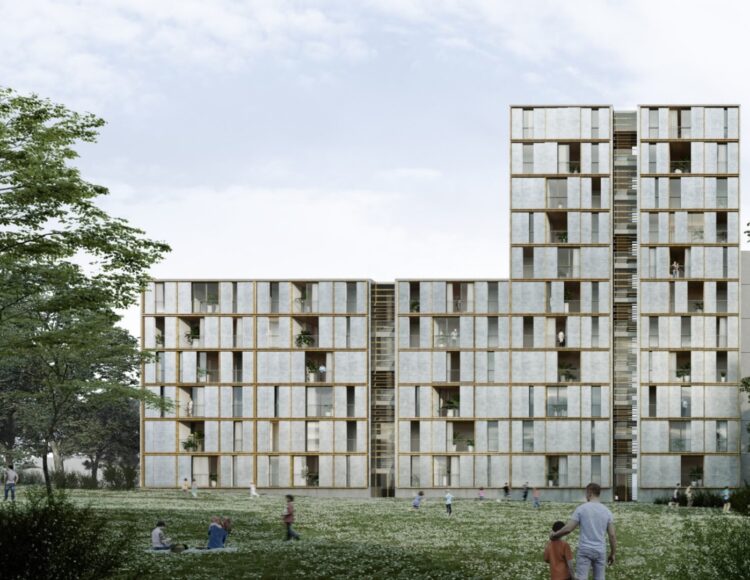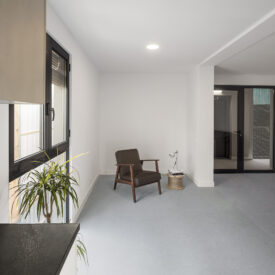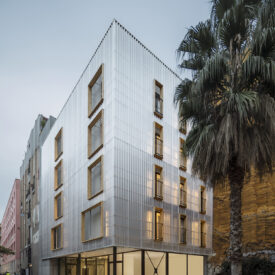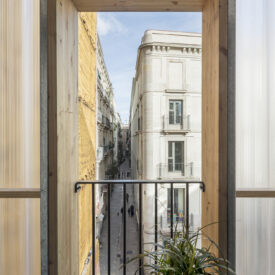The European Commission recognised the essential work of APROP Ciutat Vella in Barcelona and the help it provided to evicted households with emergency accommodation in their own neighbourhood. Eduard Cabré Romans, International Relations Consultant at the Barcelona Municipal Institute for Housing and Renovation (IMHAB) tells you how turning shipping containers into homes has made a difference to many.
APROP Ciutat Vella has been granted the New European Bauhaus award on the category of Modular, adaptable and mobile living solutions thanks to combining sustainability, social impact and beauty. Acronym for Proximity Temporary Affordable Housing, also meaning “nearby” in Catalan, APROP is a new programme launched by Barcelona City Council to provide evicted, low-income households with temporary accommodation in their own neighbourhood.
The first APROP project has been developed in Barcelona’s historical district Ciutat Vella, currently facing gentrification as a result of touristification. The building consists of a compact, 5-storey corner volume on a 186sqm plot. It hosts the extension of a nearby health facility on the ground floor and 12 dwellings on the four upper floors. All the housing units feature a living room with an open kitchen and fully accessible bathrooms. The smaller ones (30spm) have a double bedroom, while the bigger ones (60sqm) include two bedrooms.
APROP buildings will be distributed across the ten city districts on empty sites awaiting public facilities or permanent housing projects. While the first one is already in operation in Ciutat Vella, two more buildings (40 and 42 units) are currently being developed by the Barcelona Municipal Institute for Housing and Renovation (IMHAB).
Sustainable design and construction techniques
APROP’s lightweight, dry, modular and reversible construction system using reused shipping containers has been specially conceived to achieve high rates of energy efficiency and excellent architectural standards. Compared to conventional systems such as reinforced concrete or steel castings for metal structures, APROP reduces energy consumption by 25% and greenhouse gas emissions by 54%. Thanks to its off-site construction and light-weight nature, it also reduces on-site construction times by 80%.
The modular, temporary and reversible nature of the building does not undermine its architectural quality. On the contrary, APROP Ciutat Vella is a living proof of how it can become a tool for urban improvement that beautifies the city landscape while contributing to the achievement of more socially mixed and sustainable communities. The building uses a double-skin façade to establish a rich dialogue with its surroundings, while making the underlying shipping containers invisible. The translucent polycarbonate and the wooden frames highlight the voids in the facade and provide warmth, enhancing the brightness both during the day and at night without compromising the privacy of its inhabitants.
APROP Ciutat Vella relies on recycled materials and is fully reversible, that is, it avoids demolition and can be dismantled, transported and restated in other locations. The system takes advantage of the structural strength of shipping containers and their ability to be transported and stacked, and uses the same reversible twist-locks that assemble containers in harbours. Moreover, all water and electricity installations are centralised through a plug-and-play system that facilitates reversibility. The facades and roofs also use reversible dry joints.
An emerging housing model
Barcelona is currently developing 11 affordable and social housing projects using modular and industrialised construction techniques, including more than 500 units. Most of these projects rely on nature-based and recycled material, and are the result of the determination shown by policy makers and technicians alike to find solutions to two of the most pressing challenges of our times: housing affordability and climate change.
Ada Colau, Mayor of Barcelona: “Barcelona is proud to be not only the City that builds the most public housing in the country, but also a role model in finding innovative solutions to the housing crisis, while reducing greenhouse gas emissions and creating thousands of new jobs.”
Barcelona has been at the forefront of urban innovation for a long time, and is now becoming a role model for emerging housing systems. The City is introducing new housing schemes in collaboration with social and cooperative housing developers, while increasing its public rental housing stock through new construction, acquisition of privately-owned dwellings and temporary mobilisation of private units as affordable housing. It is also experiencing an increase in housing renovation and the introduction of renewable energy systems, while working to prevent gentrification and reduce evictions by limiting the number of tourist accommodations and cutting down on speculative investment in the city.
To share these experiences and bring together all those currently working to solve the housing crisis, Barcelona will be hosting the 4th edition of the International Social Housing Festival in March 2023. This will also be a major opportunity to collectively reflect on the challenges and solutions being tested across Europe, including the participation of public, cooperative and social housing developers, social movements and organisations, professionals and academics.



